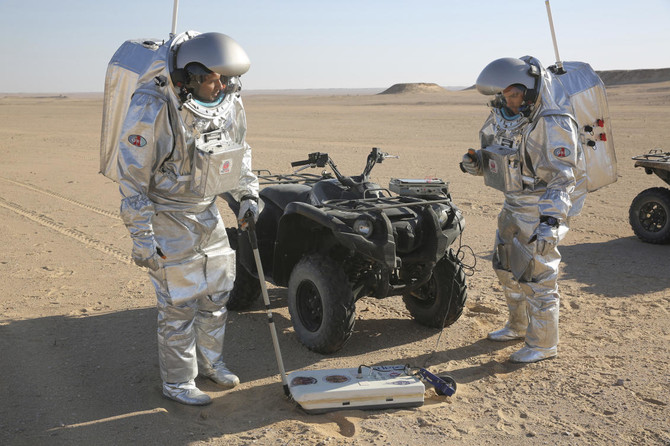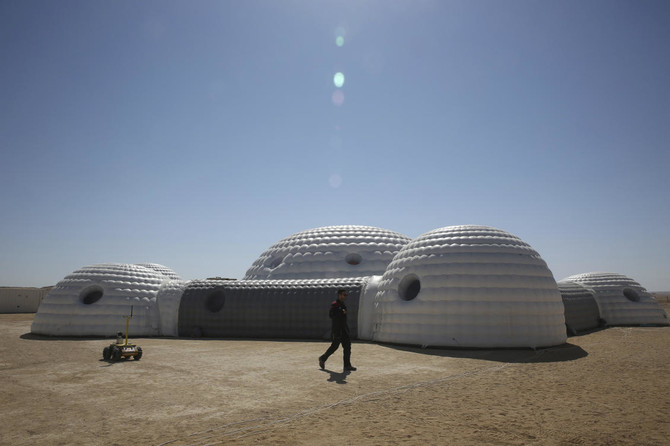DHOFAR, Oman: Would-be astronauts in aluminum-coated suits venture out in rovers from a sprawling camp in Oman’s barren desert: a simulation by a European venture aiming to one day help humans survive on Mars.
Behind a barbed wire fence protected by soldiers from the Gulf sultanate, researchers in prefab facilities work away on experiments that include trying to grow vegetables in inhospitable terrain chosen for its resemblance to the red planet.
Run by the Austrian Space Forum, a mainly volunteer collective, with the backing of the Omani government, the AMADEE-18 Mars Analog Mission has brought together researchers, inventors, space professionals and enthusiasts.
For decades the realm of science fiction, sending a manned mission to Mars is now the stated — albeit still distant — goal of the US government and entrepreneurs.
On Tuesday US billionaire Elon Musk launched the world’s most powerful rocket — the SpaceX Falcon Heavy — toward an orbit near Mars.
In this remote corner of the Arabian Peninsula’s Dhofar desert, the European-led project may be far less flashy — but it is still looking to answer major questions.
“Once we go to Mars, and stay on Mars, we will have to use the resources we find on Mars because we cannot bring everything from Earth,” forum president Alexander Soucek said.
“So we have to use the things we find there: first of all to sustain life there, to sustain missions there, and then in the longer run maybe also for other things.”
The Austrian Space Forum does not have a rocket like Musk, but its members — many with day jobs at traditional space agencies or private companies — share the entrepreneur’s drive to be innovative.
In the increasingly crowded field of space exploration, Soucek says the project is carving out a special niche with its Mars simulations.
“We get sponsors from private industry. We collect money, partnerships, invite people to join forces,” he said.
Volunteer researcher Joao Lousada was struggling into a pressure-simulating exoskeleton suit with the help of three technicians.
Weighing more than 50 kilograms (110 pounds), it is custom-built to simulate the constricted movement astronauts would feel on Mars — and takes a gruelling hours-long process just to put on.
Like the other volunteers he watched the Falcon Heavy launch with awe, but he said there were serious issues about the commercialization of space.
“You can’t claim the moon, you can’t claim asteroids so mining comes into a bit of a legal loophole,” Lousada said.
“But... I think it’s a very interesting idea. I think definitely we should look into using resources from asteroids that are not available on Earth or are less frequent on Earth.”
Once suited up, Lousada and fellow researcher Kartik Kumar mounted rovers and rode off under the blazing sun to complete their set of experiments in the desert.
Returning before dusk, Kumar — an expert on space debris — reflected on the role and responsibility of space voyagers.
“We should never forget that as we explore our own planet and the solar system we have to do it responsibly and ethically,” said Kumar.
Since 2015, the United States and Luxembourg have moved to the forefront of what has been dubbed the new space race, creating legal frameworks that could eventually allow mining in space.
The European Union has yet to take a position, as its members are on vastly different pages over the controversial topic.
“Can you just go there and take resources or not?” Soucek said.
“There are a few things you have to sort out from technical and economic and also political point of view. But as always in space, today it’s science fiction. Tomorrow, perhaps reality.”
In Oman desert, European venture sets sights on Mars
In Oman desert, European venture sets sights on Mars

Wild ghee production: Tradition of the Northern Borders region

- Wild ghee production peaks during the winter months due to high local demand
- Northern women showcase their ghee and other handicrafts at various festivals and national events
ARAR: In the Northern Borders region, women have long excelled in producing wild ghee, a staple deeply rooted in the local culture and closely tied to the region’s abundant livestock, estimated by the Ministry of Environment, Water and Agriculture to exceed 7 million cattle and camels.
Wild ghee production peaks during the winter months due to high local demand and is a key ingredient in many popular dishes, including porridge and festive meals.

Umm Nada, a local ghee producer, describes the multi-stage process: starting with milking, the milk is heated, boiled, slightly cooled, and mixed with a starter culture to transform it into “Khathir,” a traditional dairy product of naturally fermented or curdled milk similar to yogurt or kefir.
The mixture is then churned for over half an hour in a goatskin or sheepskin container called a “Samil.” After several days of mixing, the butter is melted over fire, turning into wild ghee, which is then stored in leather containers known as “Al-Nahw” or “Al-Dharf.”
Northern women showcase their ghee and other handicrafts at various festivals and national events, with the Arar market and the Lavender Hall, which provides training and development for local producers, serving as key venues for these traditional crafts.

Rights network criticizes flood compensation and rehabilitation efforts in Sindh

- Network’s fact-finding team says not much consultation was done while designing houses for flood-hit families
- It says these one-room ‘flood-resilient’ structures lack basic amenities like toilets, can’t withstand heavy rain
KARACHI: A fact-finding mission conducted by a network of rights activists in South Asia on Friday criticized Pakistan’s response to the devastating 2022 floods, highlighting significant shortcomings in housing, sanitation and health care for flood-affected communities in Sindh.
The 2022 floods, triggered by unprecedented monsoon rains and glacial melt, displaced millions, killed over 1,700 people and caused damages exceeding $35 billion, leaving vast areas submerged for months.
The fact-finding team of South Asians for Human Rights (SAHR) visited Sindh, surveying several districts, including Larkana, Shikarpur, Nawabshah and Hyderabad, from January 6-10 to assess the government’s compensation and rehabilitation efforts.
“The preliminary findings contradict the provincial government’s claims of launching one of the world’s largest housing projects for flood affectees,” said Ahmad Rafay Alam, an environmental lawyer and SAHR Bureau Member, during a press conference in Karachi.
The mission raised serious concerns over the proposed one-room “flood-resilient” housing model, calling it insufficient and lacking essential amenities such as kitchens and toilets.
“With skyrocketed inflation, the Rs300,000 ($1,077) compensation per house is unreasonably low,” SAHR said in a statement.
It maintained there was not much consultation while designing the houses, questioning their climate resilience and warning they were unlikely to survive future disasters.
“More severe natural calamities will impact this vulnerable population, and it is highly unlikely that these structures can withstand another heavy rain,” it noted.
In Dhand, a village near Mohenjo Daro, SAHR found that only four out of 40 destroyed houses had been rebuilt.
“Some families still live in tents or neighbors’ homes, and with average family sizes of six people, it is impossible to live in these single rooms, especially when some family members are married,” it said.
The regional rights network urged the government to conduct fresh surveys to ensure no genuinely affected individuals were left out. It informed that many residents had reported difficulty in finding their names on government beneficiary lists, delaying relief.
SAHR also highlighted poor sanitation and health care in affected areas, reporting that villages lacked drainage systems, leading to outbreaks of diarrhea, malaria and skin infections.
Arab News reached out to provincial officials, including Sindh’s Information Minister Sharjeel Memon and Chief Minister Murad Ali Shah’s spokesperson Rasheed Channa, but received no response.
Sadia Javed, another government spokesperson, said she would review the mission’s findings but had not responded by the time of filing this report.
Text messaging scammers stole $2M in cryptocurrency from victims, says NY lawsuit

- Scammers used unsolicited text messages to target people looking for remote work
- Victims were told to review products online in order to help generate “market data”
NEW YORK: Scammers stole millions of dollars in cryptocurrency from people seeking remote work opportunities as part of an elaborate scheme, according to New York’s attorney general.
Attorney General Letitia James said Thursday that she’s filed a lawsuit in order to recover more than $2 million that she said was stolen from New Yorkers and others around the country.
James said the unknown network of scammers used unsolicited text messages to target people looking for remote work.
They told victims that the job involved reviewing products online in order to help generate “market data,” James’ office said. But in order to begin earning money, victims were told they had to open cryptocurrency accounts and had to maintain a balance equal to, or greater than, the price of the products they were reviewing.
The victims were assured they would get their investments back plus commission, but the funds simply went into the scammers’ crypto wallets, James’ office said. The product reviews were also conducted on a website set up as part of the scheme.
The suit cites seven victims, identified by pseudonyms, residing in New York, Virginia and Florida. One New York victim lost over $100,000, according to the suit. A Florida woman lost over $300,000.
“Deceiving New Yorkers looking to take on remote work and earn money to support their families is cruel and unacceptable,” she said in a statement. “Scammers sent text messages to New Yorkers promising them good-paying, flexible jobs only to trick them into purchasing cryptocurrency and then stealing it from them.”
James’ suit seeks to return the stolen funds.
Queens District Attorney Melinda Katz said her office’s cryptocurrency unit traced over $2 million in stolen crypto and identified the digital wallets where the coins were being held. Then, working with James’ office, they were able to have the currency frozen until they could be returned to victims.
“Work scams that prey on those seeking legitimate employment not only rob victims of their hard-earned money but also shatter their trust in the job market,” she added.
UK finance minister seeks ‘pragmatic’ relations with China to boost trade

- Rachel Reeves is seeking to revive high-level economic and financial talks that have been frozen since 2019
- China is Britain’s fourth-largest trading partner, accounting for goods and services trade worth almost $138 billion
BEIJING: British finance minister Rachel Reeves said on Saturday during a visit to Beijing that she intended to have “pragmatic” relations with Chinese leaders to boost exports to the world’s second-largest economy.
Under pressure from market turmoil at home, Reeves is seeking to revive high-level economic and financial talks that have been frozen since 2019.
She joins the UK-China Economic and Financial Dialogue meeting in Beijing with Chinese Vice Premier He Lifeng on Saturday, before traveling to Shanghai, accompanied by Bank of England Governor Andrew Bailey and other finance leaders.
She is due to discuss financial services, trading ties and the importance of cooperation on issues like climate change, the Treasury said.
Her appearance offers a chance to persuade investors that she has plans to deal with a sharp increase in British government borrowing costs, due in part to a global bond selloff which threatens to derail her budget plans.
“The fiscal rules that I set out in my budget in October are non-negotiable and growth is the number one mission of this government to make our country better off,” Reeves told reporters after visiting a Brompton bicycles shop in Beijing.
“That’s why I’m in China to unlock tangible benefits for British businesses exporting and trading around the world to ensure that we have greater access to the second-largest economy in the world.”
Reeves’ visit follows a dialogue opened last year between Prime Minister Keir Starmer and President Xi Jinping, the first between the two countries’ leaders since 2018.
The approach taken by the Labour government, elected in July, contrasts with the previous Conservative administration which took a robust approach to differences with China — particularly over human rights, Hong Kong and allegations of Chinese espionage.
Asked on Thursday if Reeves would raise human-rights issues, Starmer’s spokesperson said her visit would fit with London’s stance that it would take a strategic approach to China and challenge it “robustly” when necessary.
Starmer has long described his desire to build a relationship with China that is “rooted in the UK’s national interests” by boosting trade, a task that may become more difficult if US President-elect Donald Trump follows through on his threat to impose tariffs on all imports.
Asked whether Britain would follow Washington and Brussels in imposing tariffs on Chinese electric vehicles, Reeves said: “We keep issues under review but we make decisions in our national interest.”
British car manufacturers “like Jaguar and Land Rover export substantially to Chinese markets, and we want to help them to grow.”
China is Britain’s fourth-largest trading partner, accounting for goods and services trade worth almost 113 billion pounds ($138 billion).
Saudi nature reserve unveils winter retreat near historic Laynah village

- Laynah Camp, designed for nature lovers and desert enthusiasts, is located adjacent to the Al-Dahna Desert
- The initiative is part of the Darb Zubaydah Winter festival, which aims to promote sustainable ecotourism
RAFHA: A winter season retreat close the historic Laynah village in the Northern Borders Region is now open to holidaymakers.
Designed for nature lovers and desert enthusiasts, the wilderness retreat called Laynah Camp was unveiled this week by the Imam Turki Bin Abdullah Royal Nature Reserve Development Authority (ITBA) as part of the Darb Zubaydah Winter festival, which aims to promote sustainable ecotourism and preserve the region’s cultural and historical heritage.
Laynah Camp “offers a serene atmosphere where wildlife beauty blends with the desert’s charm, providing visitors with inspiring and adventurous moments,” a Saudi Press Agency (SPA) report enthused.

Nestled amid Al-Dahna Desert, the fully equipped tent accommodation units provide breathtaking views of the natural surroundings, the report added.
To spice up the camping experience, various activities are offered, including exploratory trips and upscale camping.
Laynah village itself has its own attractions, particularly its ancient water wells, which makes it one of the most important historical sites in the Kingdom.
In a previous SPA report, researcher and heritage and antiquities expert Abdulrahman bin Mohammed Al-Tuwaijri was quoted as saying Laynah village is known to be one of the oldest settlements in the Arabian Peninsula.
“Located on the ancient trade route between Najd and Iraq, it has throughout history provided traveling caravan convoys with respite from harsh desert conditions,” the report said.






















